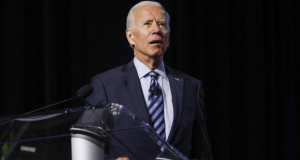Elizabeth Warren’s Unrealistic Fairy Tale Plan to Pay for Medicare for All
Warren’s ‘Tax and Spending’ Fairy Tale Built On ‘Fuzzy Math,’ New Burdens on Middle Class; Plan Could Trigger Waiting Lines, Questionable Hospital Survival
November 1, 2019
Philip Klein, Washington Examiner: “Sen. Elizabeth Warren on Friday came out with her long-awaited plan to “pay for” the “Medicare for all” proposal she supports. But it is not actually a serious proposal to solve problems that have vexed health economists for decades. It is, instead, a complete joke.”
- “She lies about middle-class tax increases…But the largest single tax increase she proposes is an $8.8 trillion tax on payrolls, which inevitably will fall on the middle class.”
- “Squeeze them too much, and it could lead to fewer providers, and thus severe access problems when tens of millions of people are being added to the system.”
NBC News: “At the same time, there’s likely to be significant skepticism from outside experts about whether Warren could achieve the tens of trillions of dollars in revenue and savings targets that the plan calls for and whether its provisions would create unintended consequences for health care and the broader economy.”
- “While Warren’s plan promises “not one penny in middle-class tax increases,” it does assume a reversal of President Donald Trump’s tax cut — a move Warren previously had backed that would raise taxes on some middle-income families.”
- “It would also require the new Medicare system to run with much less administrative overhead than the Urban Institute predicted would be necessary — 2.3 percent of total costs instead of 6 percent.”
Ron Brownstein, The Atlantic: “…deep in the plan, she severely cuts rates reimbursement rates for providers, including hospitals down to about what medicare now pays which is a lot less than private insurance and a lot of questions about even with some adjustments she talks about, whether hospitals can survive at that level of reimbursement.”
Ezra Klein, Vox: Warren promises repeatedly that you’ll be able to see the doctor and go to the hospital of your choice, but if your doctor is overwhelmed by patients, or your hospital can’t schedule your surgery for six weeks, it’s not going to feel that way. In polling I’ve seen, and having been around the health care debate for years, I suspect that the attack line with the most potency, is the dread specter of waiting lines.
Ryan Lizza, Politico: “To get a sense of how enormously difficult it is to raise the money to pay for Medicare for All, look at this section of the Warren proposal where she says that comprehensive immigration reform, a Herculean legislative feat that Bush and Obama failed at, will help pay for M4A.”
- “This plan suggests that passing something that has never been able to get through Congress is a prerequisite for Warren to pass Medicare for All. Warren has already said that her big anti-corruption package would be her first item for Congress. So that moves M4A to third in line.”
- Saagar Enjeti, The Hill: “Warren’s M4A plan relies on passing comprehensive immigration reform and then taxing newly legalized citizens. So what is the order of operations for her first 100 days? Immigration Reform -> then Medicare for All. Color me skeptical”
Michael Strain, Bloomberg Opinion: “Regardless of the fuzzy math she might offer for that specific program, her voracious agenda of government expansion — universal child care, cancellation of student loan debt, free public college and universal health care, just to take a few — is going to cost some serious money.”
NY Times: “Her new proposal marks a turning point for her campaign, in which she will have to sell voters on a tax-and-spending plan that rivals the ambitions of the New Deal and the Great Society while also defending it against both Democratic and Republican criticism.”
- “Although she is not proposing broad tax increases on individuals, her proposal will still allow Republicans to portray her as a tax-and-spend liberal who wants to dramatically expand the role of the federal government while abolishing private health insurance. Her plan’s $20.5 trillion price tag is equal to roughly one-third of what the federal government is currently projected to spend over the next decade in total.”
- “Her financing plan is based on cost estimates that are on the low side, relative to those from other serious economists who have assessed the program.”
- “Payments to hospitals would be 10 percent higher on average than what Medicare pays now, a rate that would make some hospitals whole but would lead to big reductions for others.”
Josh Barro, NY Mag: “I should note that some of Warren’s other pay-for ideas — such as a 35% minimum tax on *foreign* profits of US firms, and a wealth tax rate as high as 6% on billionaires — strike me as quite implausible.”
- “Substantively domestic profits shifted to tax havens is one thing. But US multinationals have lots of bona fide foreign income, mostly in countries with tax rates lower than 35%. This would be a major disadvantage for US firms vs. foreign competitors.”
Josh Barro, NY Mag: “I’m all for better tax enforcement but I’m not sure I’m for counting on trillions in extra revenue over a decade through better tax enforcement.”
Philip Klein, Washington Examiner: “For decades, whenever politicians have drawn a blank in attempting to fill a financing nut, they always turn to eliminating “waste, fraud, and abuse” as sort of free money. It’s an old trick, but it’s quite remarkable for Warren count on it raising more money than the 10-year cost of Obamacare.”
Benjy Sarlin, NBC News: So basically, she has a plan for that. Is it a great plan? Will it’s assumptions hold up? Would it have major unintended consequences? All absolutely crucial policy questions that also become irrelevant to her job as soon as 20 D senators kill it on her first day in office.
Keep tabs on the Democrats. Sign up for news.
Keep tabs on the Democrats. Sign up for news.






